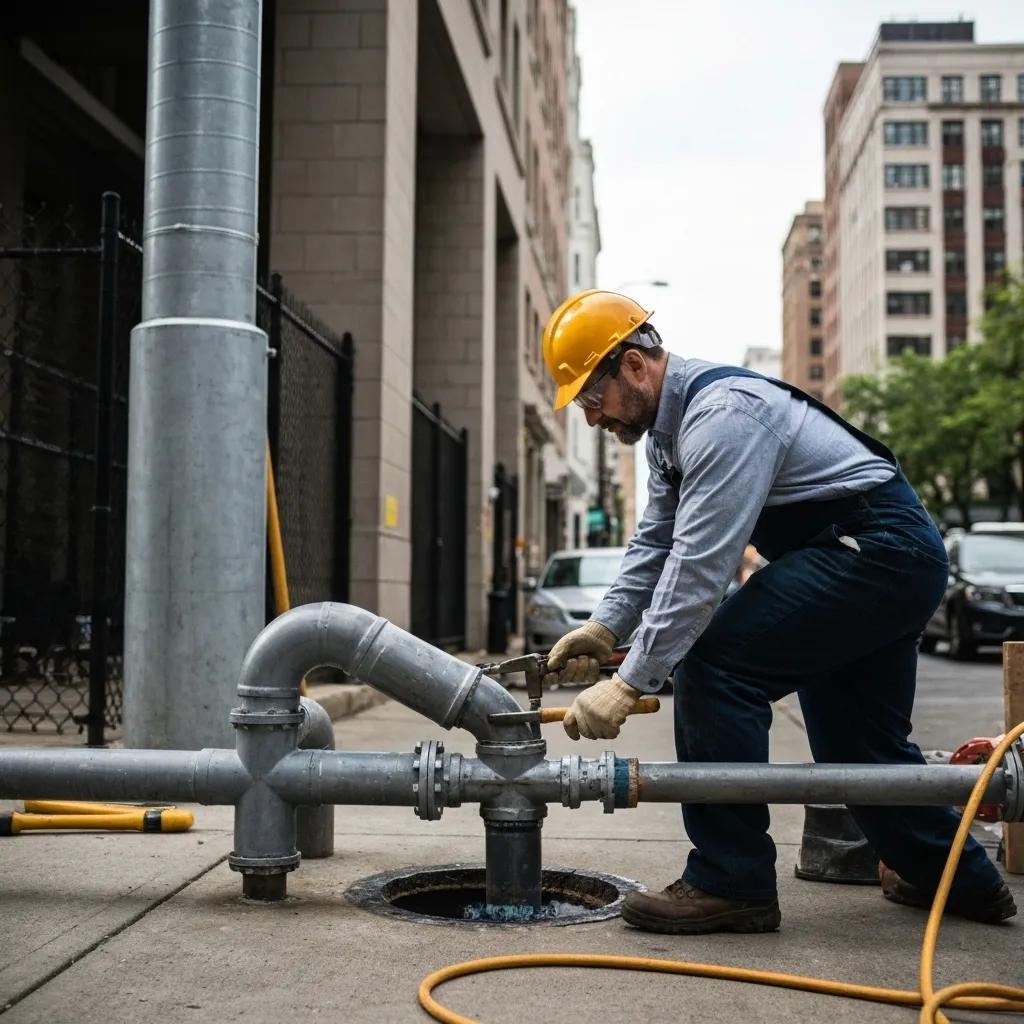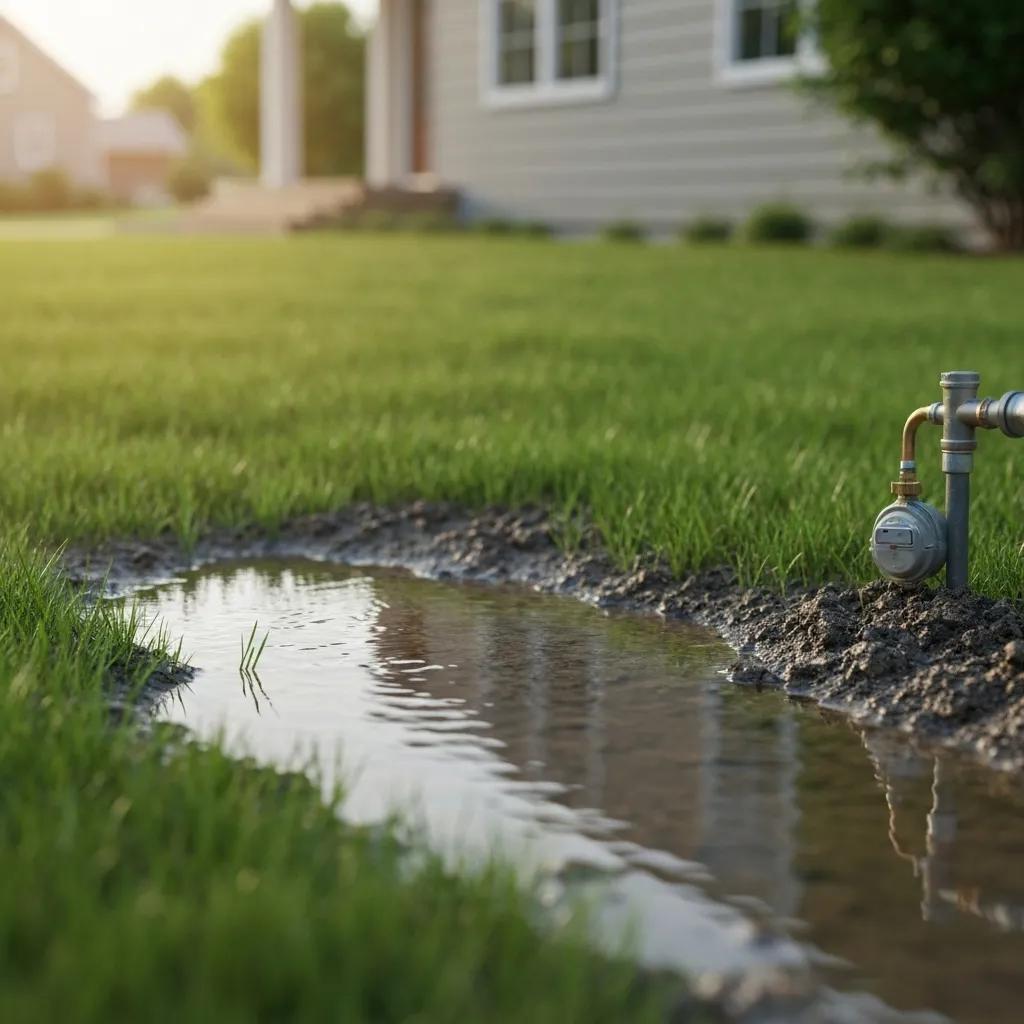Who's On the Hook for Water Main Repairs? Your Guide to Homeowner and City Responsibilities
Learn who is responsible for water main repair and how timely action can prevent costly damage. Ensure your property's safety with expert guidance today.
Free Estimate

Figuring out who foots the bill for water main repairs is key to avoiding surprise expenses and keeping the water flowing. Knowing the line between public water mains and your private service lines means you can jump into action fast when leaks or breaks pop up. This guide breaks down water main repair duties for homeowners, cities, and utility companies. We’ll cover the difference between mains and service lines, how insurance plays a role, what to do in an emergency, how to prevent issues, Orlando’s specific rules, and what’s up for commercial properties. You’ll learn who owns each part, how extra insurance can save your wallet, and why calling in the pros at Brightwater Plumbing is the smart move.
What's the Difference Between a Water Main and a Water Service Line?
Clearly understanding the distinction between water mains and water service lines clears up any confusion about who’s responsible for upkeep. A water main is a major pipeline in the public system that brings clean water to entire neighborhoods. Your water service line is the smaller pipe that connects that main to your specific property. So, if a big pipe under the street bursts, the city handles the fix. But if a leak is on your property, that’s on you. Getting this difference straight is the first step to knowing who pays for what.
What Exactly Is a Water Main and How Does It Keep Our Water Flowing?
A water main is a large, pressurized pipe that’s part of the public water system, designed to distribute treated drinking water throughout a community.
It carries water from treatment facilities or reservoirs along public streets, feeding into many different service connections.
Since the city or county government pays for, installs, and maintains these mains, they’re also the ones responsible for any repairs, ensuring everyone connected stays supplied.
What Is a Water Service Line and How Does It Get Water to Your House?
Your water service line is the smaller, private pipe that runs from the water meter at the curb all the way into your home’s plumbing system. It’s the direct route for municipal water to reach your faucets, appliances, and sprinklers. Because you own and control this pipe from the meter onwards, any work needed on it—repairs, replacements, or regular checks—is your responsibility.
How Do Water Mains and Service Lines Differ in Who Owns Them and Who Fixes Them?
Here’s a quick rundown of these two types of pipes and who’s typically in charge:
Public water mains deliver water to your service line, and the city takes care of the main right up to the meter. From the meter to your house, it’s your responsibility. This clear ownership split dictates who needs to pay for and arrange for repairs.
The Line of Responsibility: Where the City's Obligation to Plumbing Line Repairs Ends and Yours Begins
Municipalities are typically responsible for water mains and the service line up to the water meter, while homeowners are responsible for the service line from the meter into their property. This clear division of ownership dictates repair obligations for water and sewer lines.
This information directly supports the article's explanation of the distinction between water mains and service lines and clarifies who is responsible for repairs based on property boundaries and meter location.
Understanding these basic differences is the first step to knowing who to call when something goes wrong.
Who's Responsible for Water Main Repairs: Homeowners, Cities, or Utilities?
Who handles water main repairs really comes down to where the pipe is located in relation to your property lines and the water meter. Pinpointing accountability ensures that the right people tackle issues within their domain. Whether a break happens under the street or in your backyard, clear ownership prevents delays and arguments. The next sections will lay out what homeowners need to do, the city’s role, how boundaries matter, and what’s different for commercial properties.
What Are Homeowners Responsible for When It Comes to Water Line Repairs?

Homeowners are responsible for the private water service line that runs from the meter at the curb into their property, as well as all the plumbing inside the house. Your main duties include:
- Keeping your service line in good shape to avoid leaks and corrosion.
- Fixing any breaks or cracks caused by shifting ground, tree roots, or just old age.
- Paying for repairs to your private pipes and any damage they cause to your property.
If you skip regular maintenance, you might end up with bigger repair bills and water damage. Taking care of these private lines ensures water gets to your home safely after the meter.
What Are the Responsibilities of Municipalities and Water Utilities for Water Mains?
Cities and water utility companies are in charge of the water mains, the big transmission lines, and the meters up to your property line. Their main jobs include:
- Regularly checking and maintaining the public pipelines.
- Responding to breaks in the main lines, issues with corrosion, or drops in pressure in the primary pipes.
- Notifying the public about service interruptions and managing repairs that happen in the street.
By taking care of the mains, the city helps ensure the community’s water is safe and consistently supplied. Public works crews use specialized equipment and teams for major pipeline work.
How Do Property Lines and Water Meters Determine Who Fixes What?
Your property line, along with the water meter, marks the spot where the public water system meets your private one. The meter serves as both a dividing line and a way to measure water usage. The city maintains the pipes leading up to the meter, while you’re responsible for everything from the meter onward. This clear boundary prevents confusion about who should be called when leaks are discovered.
Are There Special Rules for Landlords, Tenants, and Commercial Properties?
Lease agreements and who owns the property can sometimes make repair responsibilities a bit tricky. For rental situations:
- Landlords usually cover the cost and arrange for service line repairs, unless the lease says something different.
- Tenants should report any leaks right away to prevent bigger problems and higher costs.
- Owners of commercial properties might have service agreements with plumbing companies for quick repairs when needed.
Commercial buildings often have complicated plumbing systems, so it’s important to have clear lease terms that spell out who’s responsible for repairs and avoid business interruptions.
How Does Insurance Affect Water Main Repair Costs and Responsibilities?
Your insurance policies and any extra coverage you have can significantly impact how repair bills are handled and who ends up paying. While your homeowner’s insurance likely won’t cover issues with public mains, private service lines often aren’t covered by standard policies either. Understanding your options can help protect your finances when underground pipes fail.
Does Homeowners Insurance Cover Water Main Breaks and Repairs?
Typically, standard homeowners insurance policies don’t cover gradual damage like wear and tear on underground pipes, including breaks in your water service line. Policy language usually limits coverage to sudden, accidental damage that happens inside your house. This means repairs for service lines and leaks outside your home are usually your own expense.
What Is Service Line Coverage and How Does It Help Homeowners?
Service line coverage is an optional add-on to your insurance policy that extends protection to underground utility pipes on your property. It can cover the costs to repair or replace water, sewer, electrical, or gas lines that are damaged by things like corrosion, tree roots, or mechanical issues. By getting this coverage, homeowners can shift the responsibility for repairs to the insurance company and avoid facing large, unexpected bills.
What Is Service Line Coverage, and Do You Need It?
Standard homeowners insurance policies often exclude coverage for damage to underground utility lines on private property. Service line coverage is an optional endorsement that can be added to a homeowners policy to cover repair or replacement costs for these lines, including excavation and landscaping restoration.
This research clarifies how homeowners insurance typically handles service line damage and highlights the value of service line coverage, directly supporting the article's section on insurance impacts.
How Can Homeowners Get an Idea of Water Main Repair Costs?
Estimating repair costs depends on factors like how deep the pipe is, what it’s made of, how long it is, and how much digging is needed. Common cost factors include:
- The type of pipe material (like copper versus PVC).
- How deep and long the service line is that needs replacing.
- Restoring the site, which might involve fixing concrete, landscaping, or driveways.
- Fees for permits and inspections required by local authorities.
Getting quotes from licensed plumbers will give you a more accurate budget and help you avoid any surprises.
What Are the Signs of a Water Main Leak and What Emergency Steps Should You Take?
Spotting a water main leak early and acting fast can prevent major property damage and keep your water service running. Catching leaks early protects your home’s foundation and your yard, and having a plan for emergencies helps get your water back on with minimal disruption.
What Common Signs Point to a Water Main Leak on Your Property?

You might notice these clues that suggest a hidden water main leak:
- Puddles or unusually wet spots in your yard.
- A noticeable drop in water pressure at your faucets and showers.
- Your water bill suddenly jumps without any change in your water usage.
- You hear strange gurgling or hissing sounds coming from underground near pipes.
What Immediate Actions Should You Take When You Suspect a Water Main Leak?
Follow these steps to minimize water loss and protect your property:
- Turn off the main water valve at your meter to stop the flow.
- Call your water utility if you think the leak is on the public main side.
- Contact a licensed plumber to figure out the problem and fix your private service line.
- Take pictures of any damage for insurance claims or permit needs.
Why Choose Licensed Plumbers Like Brightwater Plumbing for Water Main Repairs?
Brightwater Plumbing Orlando offers expert water main repair services with licensed and insured technicians available around the clock. Our family-owned business provides:
- Clear, upfront pricing – no hidden costs.
- Fast emergency response to get your water back on.
- High-quality work backed by a satisfaction guarantee.
- Local knowledge of Orlando’s soil and older infrastructure.
Trusting professional plumbers means safe digging, repairs that meet code, and long-lasting results.
How Can Homeowners and Businesses Prevent Water Main Issues?
Regular upkeep and careful work around your property can help you avoid costly main breaks and service interruptions. Proactive checks can catch early signs of trouble, and proper digging practices protect pipelines during construction or landscaping.
What Regular Inspections and Maintenance Help Avoid Water Main Breaks?
Keeping an eye on your private lines regularly helps them perform well over time. Homeowners and businesses should:
- Schedule professional camera inspections every 5 to 10 years.
- Flush your lines occasionally to clear out any sediment.
- Watch your water pressure for sudden increases that could stress pipes.
- Address small leaks or signs of corrosion right away before they get worse.
Consistent care reduces the chance of sudden failures and makes your pipes last longer.
How Should Property Owners Protect Their Water Service Lines During Landscaping or Construction?
Digging and heavy equipment can pose risks to underground pipes. To keep your service lines safe:
- Call utility locating services before you start any digging.
- Clearly mark where pipes are located and consider trenchless methods if possible.
- Use hand-digging or specialized tools when working near pipelines.
- Properly compact the soil around repaired trenches to prevent settling.
By following safe digging practices, property owners can prevent accidental damage and keep their water service working smoothly.
What Are the Local Regulations and Nuances for Water Main Repair Responsibility in Orlando?
Orlando’s city rules and water utility policies lay out specific duties for maintenance and repairs. Knowing these local regulations helps you stay compliant and avoid costly delays with permits.
How Does Orlando Define Water Main and Service Line Responsibilities?
The City of Orlando and its water providers are responsible for water mains and meters up to the property line, as outlined in city codes. Homeowners are responsible for the service line from the meter to their home’s plumbing. These definitions line up with state regulations and standard practices for underground utilities.
Where Can Orlando Residents Find Official Resources on Water Line Repair Responsibility?
Residents can find helpful information from official sources:
- Orlando Utilities Commission rate and policy guides.
- The City of Orlando Public Works Department’s official website.
- Orange County’s building permit and plumbing code manuals.
Checking these city publications will clarify who’s in charge and what permits you might need for both public and private repairs.
How Is Water Main Repair Responsibility Managed for Commercial Properties and Businesses?
Commercial properties often have larger service lines, shared meters, and multiple tenants. Having clear contract language and proactive maintenance plans in place is crucial to avoid service disruptions that can hurt business.
Who Is Typically Responsible for Water Line Repairs in Commercial Properties?
For commercial buildings, the property owner or facility manager is usually responsible for service lines within the private property boundaries. The city’s utility company still manages the mains up to the meter or vault. For complex systems serving multiple tenants, coordination between landlords, tenants, and specialized plumbing contractors is often necessary for smooth repairs.
How Do Lease Agreements Affect Water Main Repair Responsibilities?
Commercial leases frequently specify who handles repairs through particular clauses:
- Triple net leases typically pass all maintenance costs, including service line repairs, onto the tenant.
- Gross leases usually put the repair duties on the landlord, unless otherwise agreed upon.
- Shared facility agreements may require both parties to split the costs for pipes used by everyone.
Carefully reviewing and negotiating lease terms upfront sets clear expectations and prevents disagreements over who pays for repairs.
Clearly defining repair duties for commercial properties ensures businesses can keep operating without unexpected plumbing issues.
Regularly reviewing and enforcing lease terms helps maintain reliable water service and avoids costly downtime.
Reach out to Brightwater Plumbing Orlando for expert water main repair and leak detection services.
Get a Free Quote!
Terms and Conditions
Request a Quote
Terms and Conditions
Request a Quote
Terms and Conditions

